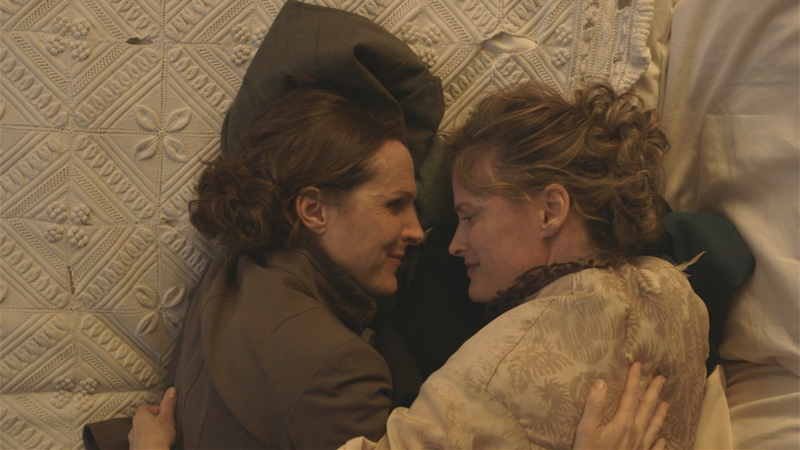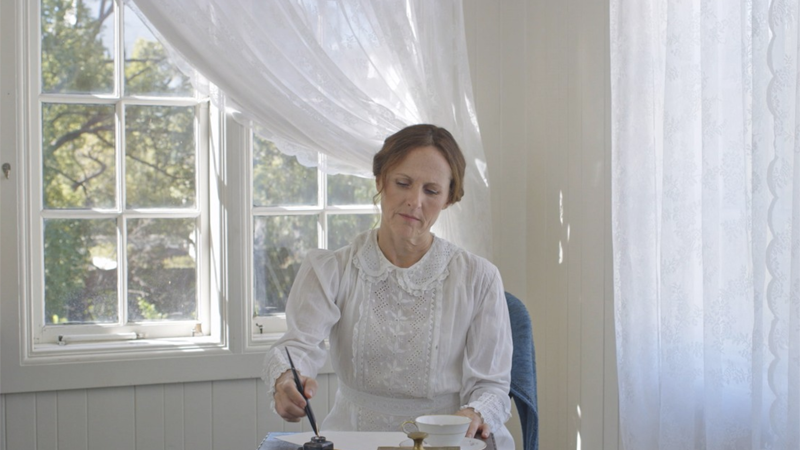History is full of women whose brilliance and accomplishments were ignored, annexed, or extinguished by the men around them; while the few women whose legacies survived have often been posthumously striped of autonomy, agency, and authority over even their own stories. In Wild Nights With Emily, writer/director Madeleine Olnek asks us to imagine a world where that’s what happened to “reclusive, angsty, nun-like” Emily Dickinson. And to jolt our imaginations into action, she weaves together a hilarious, affectionate, piercing film — sourced directly from Dickinson’s own letters and poems, without the unnecessary interpretation of male historians or critics — that’s one part epic lesbian love story; one part poetic biopic; and one part relentless, satirical skewering of the patriarchal literary establishment that shaped our impression of Dickinson as a dour, virginal spinster.
Which is to say: if someone found a way to use alien tech to scan my brain and create exactly the movie I’ve been waiting to see my entire life, this would be it.

Molly Shannon’s Emily Dickinson is brilliant, yes; and a little moody and a little needy, but she’s also warm (often dressed in soft white cotton and bathed in sunlight at her desk or in her sitting room) and generous and ambitious and wry and sexy. She’s also very much in love with Susan, her childhood best friend and her brother’s wife. They kiss on the cheek, peck on the mouth, and then fall to the floor in an open-mouthed kissing embrace in the movie’s opening scene. It’s funny, but it’s also not. “Her breast is fit for pearls,” Dickinson once wrote about (and to) Susan (the name “Sue” was discovered to have been erased from the top of the original poem). “Her heart is fit for home / I — a Sparrow — build there / Sweet of twigs and twine / My perennial nest.” Their love story is played with lusty, tempestuous familiarity in the present by Shannon and Susan Ziegler, and tender, heartbreaking hope in teenage flashbacks by Dana Melanie and Sasha Frolova.
Susan is Emily’s muse and she’s also her biggest supporter. She encourages Emily to try to submit her poems to magazines and newspapers, talks her up when The Atlantic Monthly‘s poetry editor, Thomas Wentworth Higginson, pays her a visit, and talks her down when he’s too intimated by her mind and baffled by her cleverness to publish her. In one of the funniest and most furiously feminist scenes in the movie, Higginson asks Emily what poetry is. He leaves the question hanging for just a second, just long enough to dramatically answer it himself (by quoting another man), but Emily doesn’t realize he’s setting himself up to hear his own voice. She says, “If I feel physically like the top of my head is taken off, I know that is poetry.” She pauses, doesn’t even glance at Higginson, and continues, “If I feel so cold no fire can ever warm me, I know that is poetry.” She stands, paces, ruminates on the difference between “women’s authorship” and “authorship”; the way “women’s writing” is talked about “like a rescue effort from our troops needs to be sent to its aid”; and the problematic nature of the male experience being understood as universal.
The radiance and timelessness of her wonderings are driven home when Higginson interrupts her to say, “We need to hear intelligent women’s voices, but I can hardly find any.”
He also tells her to try to rhyme more.

Wild Nights With Emily‘s narrative structure is a little Brontë-esque — honoring them almost as much as elderly Judge Otis Lord’s commentary on Wuthering Heights and Jane Eyre, in which he mangles the novels together but remembers distinctly that it’s a story about how plain girls deserve love too — with both past and present Emily’s stories being told by Mabel Todd, Emily’s brother’s mistress, the woman who vanity published Emily’s poems after her death and helped shape her image as a recluse.
I expected to laugh watching Olnek’s film. The trailer delighted me and I’ve been eager to see it since it made its way around the festival circuit last year. What I didn’t expect was to guffaw until tears were streaming down my cheeks and then just keep crying because I was so moved. I also didn’t expect the movie to capture the essence of one of Dickinson’s most beloved poems:
Tell all the truth but tell it slant —
Success in Circuit lies
Too bright for our infirm Delight
The Truth’s superb surprise
As Lightning to the Children eased
With explanation kind
The Truth must dazzle gradually
Or every man be blind —
During one of their meetings, Higginson tells Emily, “When I read your poetry, Miss Dickinson, I’m left feeling… I’m not sure what.” He could be paraphrasing the countless reviews written by male critics about queer and feminist art throughout history. Emily demures, but she could have told him that her poetry, like this film, was written without a man in mind.
Wild Nights With Emily opens in NYC this weekend. Catch me at the 7:15 screening on Friday, April 12th at The Landmark at 57 West where I’ll be hosting a post-film Q&A with director Madeleine Olnek. In the meantime, please treat yourself to this delectable essay about Emily Dickinson’s recipe for black cake from our Birthday Issue.








Comments
Dusting off my ol login (wow, I haven’t commented here in AGES) to say YES!
I was so lucky to see this at the Sarasota Film Fest last year with the writer/director present. One of the best movies I’ve seen in years. I too laugh-cried several times over. I’m so happy others will soon be able to see it, and I can soon watch again, and discuss. Oh, my heart.
I feel like “molly shannon as emily dickinson” would be something that my vivid celexa dreams would come up with, and I could NOT envision it until I got to the first photo, at which point I fell all in! This is exciting!
Right! She’s brilliant in this, she really is. It’s perfect casting.
I really want to see this!
Can’t wait.
I know I stan for Molly S. so hard, but she can do anything; just watch Year of the Dog, Other People, The Other Two!
Hooray for your review! I saw this at the North Carolina Gay + Lesbian Film Festival (which will be renamed the OutSouth Queer Film Festival in 2020, FYI) last August and LOVED it. I’m so happy it’s finally getting a wider release.
Before this review I was excited to see this film, but now I’ve read it I am a hysterical blancmange whose existence is defined by excitement for this film.
If, on the back of this and The Favourite, a new golden age of absurdist comedies based on the lives of historical women were to dawn, I might forgive the world for otherwise not having its shit together right now.
I love this review so much! I had the fortune of seeing the film at a screening in November, and Madeline Olnek did a Q&A alongside Martha Nell Smith, the woman largely responsible for restoring Susan Dickinson’s name back to Emily’s biography. It was illuminating.
I especially love the way the film uses Dickinson’s verses. The side-by-side death and burial scene was really powerful.
One quick note. Mabel Loomis Todd was never Austin Dickinson’s wife. She was his mistress. She was married to David Peck Todd until her death in 1932. Austin Dickinson was only ever married to Susan Dickinson. The whole affair was horrifically messy and resulted in at least one lawsuit that resulted in Todd holding Dickinson’s writing hostage for a good number of years. But it is important to note that the Dickinsons never divorced. Austin died in 1895, and Susan lived until 1913. Can you fix that in your review, please?
Thank you Sylvia for pointing that out- it IS important that Austin and Susan never divorced. Mabel was never his wife.
I live in the deep South- haven’t seen this yet but I really, really hope it comes to a place close enough for me to see it! I have been praying for someone to finally get this right- maybe these people did
So like 8 years ago I was part of a dance collective that made work based on Emily Dickinson’s life and writings. And for my piece I did a whole thing about baking and grief (i even used her recipe for black cake as part of the sound score!). And it was a duet for two dancers. And I got some push back from people who saw it who said that it was “too lesbian” and was misrepresenting Emily. . . needless to say I’m feeling super fucking vindicated! And in retrospect wish I had been brave enough to make it a more explicitly intimate duet.
Anyway, I later made it into a dance film and if you wanted to see it, you can check it out here: http://bit.ly/emilycrumbs
Can’t wait to see this film!
I feel like this would end up being depressing in the end if we’re going by the real life story. How does the film avoid this? Does it?
Just saw the movie and I didn’t find it depressing in the end! There are sad and serious moments, but there’s humor throughout. It’s a bit nonlinear in that it uses her legacy as a framing mechanism, and I think that helps it not feel depressing.
I can’t wait to see this!!
It’s finally playing in my state! It was outstanding, even surpassing my expectations. I knew that Molly Shannon could do drama as well as humor since Year of the Dog was released, but she has such an earthy sexiness in this I was truly hypnotized.
My only quibble: no Carlo, the only male she seemed to truly love.